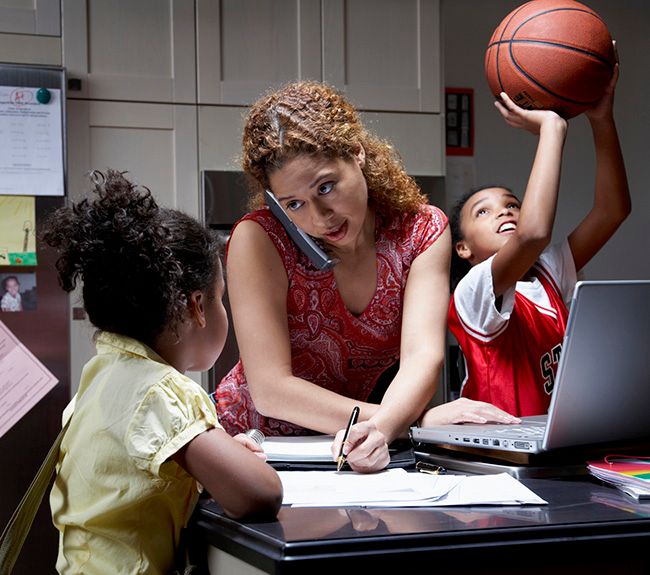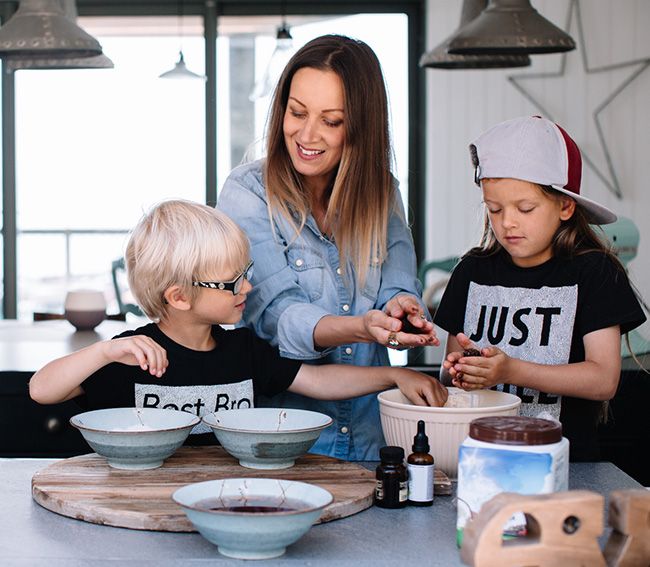Being a mother is one of the hardest gigs out there. It requires a mental energy that comes with a huge emotional pull that is rarely experienced with such force in other areas of life.
SEE: Alesha Dixon talks balancing ambition with passionate parenting
It's physically demanding too of course, and doesn’t end when work finishes, at the weekends, on holiday or even at night when you are asleep or when your children are independent… you are always on call and often on constant high alert.
What is a mental load?
Motherhood can be an exhausting and lonely place to find yourself, carrying the mental load of your family, even when you are well supported and parenting together with a partner or others.
The mental load might be shared but that doesn’t mean it’s halved or becomes a smaller fraction of the total.
Motherhood can be challenging
We will all have learned behaviours that allow us to manage and survive challenging times as parents, but not all of them will be as helpful or healthy as they could be, and sometimes we continue to employ these short-term survival strategies over the long term, which can result in a reduction in our wellbeing.
As parents, worry can seem like a constant companion as we attempt to be everything for everyone.
Juggling this many balls in the air will inevitably lead to some being dropped every now and again, but we are so quick to feel like it’s our fault whenever this happens and to feel guilty, which again, just increases the mental load.
How to manage your mental load
So, let’s take a breath. For any This is Us fans out there, you may remember that they talked about unacknowledged grief being like taking a deep breath in and then holding it for the rest of your life.
In many ways, the whirlwind of parenting can be very similar to feeling like you are always holding your breath, with little opportunity to release it. What can we do about this? How can we safely release our breath?
We can start with a simple reframe; what about instead of thinking about our ‘mental load’ we look at how we manage our 'mental energy'.
A different wording of the same problem can be surprisingly effective when it comes to helping our brain open up to a different approach. Looking at it as a mental ‘load’ immediately lets our brain know that it’s heavy, that it will take effort and energy to carry it around and so we respond accordingly.
If we look at it as managing mental energy (or any other term that works for you) it suddenly feels like it has the ability to change and shift, possibly quite rapidly, just as your physical energy changes over the space of a day!
Being a mum is also very rewarding
How to shift your mindset
So how can we shift our mindset in a way that helps us manage the emotional and mental energy required to be a mum?
I think one of the most important things we can do as a parent to manage our energy, is to focus our time on those things that align with who we want to be and how we want to live our lives, and then prioritise activities, behaviours and thoughts that take us towards experiencing more of this.
What we tend to do instead is focus on what we have to do, before we’ve even decided whether that is important to our overall sense of who we are.
Take a moment to reflect not on what you are doing well or 'badly', but on whether 'how' and 'who' you are being is what you want.
Our behaviours can shift when we challenge the thinking behind them, so when you are rushing around ticking off that to-do list you might be being efficient, but is that what you were aiming for as a parent?
When you thought about the type of parent you wanted to be, was 'efficient' at the top of your list? What was at the top of your list and what is getting in the way of that?
Understanding what you care about most, is how you identify where the majority of your time and energy needs to be spent in order for you to feel at your best.
MORE: Giovanna Fletcher's top tips for an organised school run - and how to deal with any meltdowns
Choosing three words
If you had to choose three words to describe what you value as a mother, what would they be?
As much as possible you want to use these three values to help you create a decision-making tool!
Let’s say for example that you value: patience, fun and learning. Your aim would be to create as many opportunities for you to demonstrate and experience these three things as possible. So, think about how you can demonstrate patience, as well as how you can create opportunities for your children to understand the importance of it.
It’s not realistic of course to always be having fun, or always to be patient, but if we use these as guidelines they can act as a compass and bring us back to the direction we want to go in when things get overwhelming.
If you are finding you are always stressed or often worried, it’s quite possibly because you have not had enough opportunities to express and experience your values, so taking a step back and looking at how you can create more opportunities for these things will make a huge difference, even if they are just small moments or short pockets of time.
As parents, we feel like we should be able to be superheroes
Let go a little
Mental and emotional energy is used up most quickly when we are focused on things that we cannot control. As parents, we feel like we should be able to be superheroes, capable of non-human feats like removing all pain, sadness, jeopardy and fear from our children’s lives.
The truth is, that we can’t, but we spend a huge amount of our limited energy on trying different ways to do this. That’s not to say there’s nothing we can do of course! But we have to shift our focus first.
So again, we can reframe the question from 'how do I make everything better for my children' to 'how do I help my children to make things bette for themselves?'
It's a shift from a 'let me do this for you' mentality to a 'let me help you do this yourself' one. Not only do we better equip our children to deal with the world around them, but we also focus our own energy on something that will actually make a huge difference (unlike that worrying we do last thing at night!).
What you can do
The first thing I would recommend is to write down all of the things that concern you during the day, almost like a diary entry and keep this up for at least two weeks, ideally a full month so that you can notice repeating patterns.
What you should notice is that the mental energy required is not the same all the time, some days are much harder than others and some seem to be super busy and yet you felt productive and found it easy, if not enjoyable to have to problem solve and organise!
What you will probably also notice is that on those days when you feel on fire and the mental energy is easy to manage, you are probably focused on things you have control over.
On those days when it feels like nothing is working and everything is on top of you, it’s because your energy has been taken up on things that you can't control.
Look back at your list of things that have concerned you and divide it into two separate lists. One list should represent all the things that worried you, concerned you and took a lot of mental time and energy but that you had no control over. These are things like times when you have been concerned about the opinions of others, the school the children will get into, whether your child will manage ok on their first sleepover.
Now look at the list of things and decide those that you were concerned with that WERE in your control, for example, things that are in your control, for example applying to the schools, reassuring your child and setting up a way for them to get hold of you.
As you reflect on this, do you notice that those days when you feel great (even though it’s been a lot to manage and juggle) are also those days when you are focused on things that you can do something about and are moving forwards on those things?
Have you also noticed that they are probably also days when your thoughts, feelings and behaviours have been in line with your values? No doubt this will, at least in part, be affecting the way you feel and the 'mental load' you feel you need to carry.
Realisations
More often than not you will notice that bad days are accompanied by a sense of failure or inadequacy or even guilt.
I can guarantee that the vast majority of those days when you felt this way were not because you aren’t good enough, or that you are actually 'failing', it’s because you are trying to control and affect things that you cannot do anything about.
So it’s important for our overall wellbeing to first ensure that we are using our time and energy on things we value, and secondly that we are focusing on the things we can control – but how do we settle the mind that wants to hold the weight of the world and solve problems that we are not in control of?
We're here to help, not control
We can remember, firstly that our job as a parent is not to control the world around our children, but to help them to know how to navigate the world for themselves, to give them the tools to thrive.
This involves us being prepared to let them make mistakes, to fail and sometimes, to face difficult things that we would rather they didn’t ever have to face.
This actually removes a lot of the sense of pressure and brings us back to the idea that it is not all about what we do, it is more about who we are. Children learn from what they see and what they sense about what they see.
Secondly, we can remember to breathe out, to do the things that allow us to release that breath, to experience and express our values so they bring us back to what is important.
And finally, we can spend less of our time and energy focused on things that no amount of worry, concern, thought or organisation will be able to control and teach our children to do the same.
Like this story? Sign up to the HELLO! Family Hub newsletter to get other stories like this delivered straight to your inbox.












